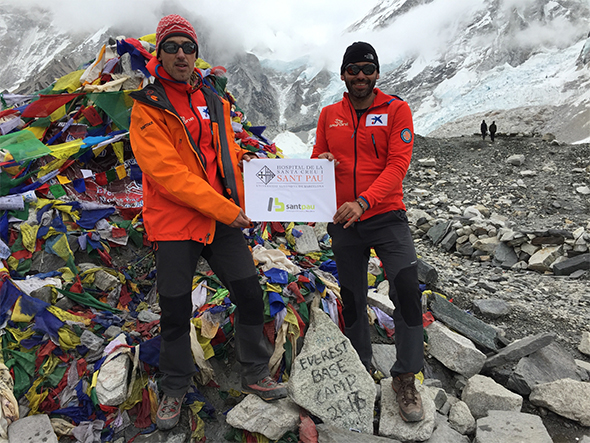
The Complex Disease Genomics Group Research of the Sant Pau Biomedical Research Institute (IIB-Sant Pau) will lead a study on the response of gene expression in extreme environmental situations. This study will be carried out in collaboration with the Polytechnic University and the Clinical Hospital from the data collected in the expedition “K2WinterTopApeal” of the mountaineer Alex Txikon, who will leave for Pakistan next January.
The research will analyse the genetic, physiological and biomedical impact of the lack of oxygen (hypoxia) in trekkers during the approach and ascent of K2 (8,611 m) in the Karakorum (Pakistan). For the study, the biological samples of 17 climbers, led by Alex Txikon, will be analyzed.
In the first stage, samples will be taken from the trekkers and mountaineers in Bilbao as a baseline situation, at sea level, before leaving for Pakistan; in the second stage, samples will be collected again in Bilbao 24 hours after the return, to determine recovery once the baseline situation is returned to sea level. Biological, clinical and environmental data will also be taken during the different stages of the ascent to see how the body acclimatises to the altitude and thus be able to identify the genetic mechanisms of adaptation to hypoxia or lack of oxygen in extreme environmental conditions.
Aim of the study
The main objective is to identify the genetic factors and regulatory mechanisms associated with the physiological changes caused by exposure to extreme environmental hypobaric hypoxia from what is known as OR data:
Who can benefit from this study?
Particularly noteworthy is the design, strategy and innovative approach of the project that can be extrapolated to other studies.
About the researchers who will participate in the project
Dr. José Manuel Soria: Head of the Genomics and Complex Diseases Unit at the Sant Pau Biomedical Research Institute in Barcelona (IIB-Sant Pau). He is an expert in the study of genetic bases with complex traits associated with cardiovascular pathologies and in genetics in sports medicine.
He has led different national and international projects, with more than 150 publications in international journals. One of his most important projects is SHERPA_Everest’2017, where the bases of genomic research in adaptation to altitude and lack of oxygen have been established.
Their work has received various national and international awards, including the prestigious Science and Innovation Forum Award for Excellence in Knowledge Transfer. He is a great fan of mountaineering and has participated in several expeditions to the Himalayas. https://www.recercasantpau.cat/es/grupo/genomica-y-bioinformatica-de-enfermedades-de-base-genetica-compleja/
Emma Roca, graduate in Biochemistry and elite ultramarathon mountain athlete. She is currently working on her doctoral thesis in the SUMMIT project. The main objective is to determine whether the population that practices long-duration, high-intensity exercise has a greater health risk compared to the sedentary population and the moderately active population. http://www.emmaroca.com/es/tesis/
He is part of the research team of the SHERPA_Everest’2017 project, which is evaluating cardiac parameters and muscle damage associated with hypobaric hypoxia in Everest.
Dr. Laura Pelegrín is assistant of the Ophthalmology Service of the Hospital Clínico de Barcelona. Specialist in retina and macula, she is part of the SHERPA_Everest’2017research team, evaluating vascular damage to the eyes in mountaineers and trekkers subjected to hypobaric hypoxia in Everest. https://www.researchgate.net/profile/Laura_Pelegrin
Last update: 09 de January de 2019